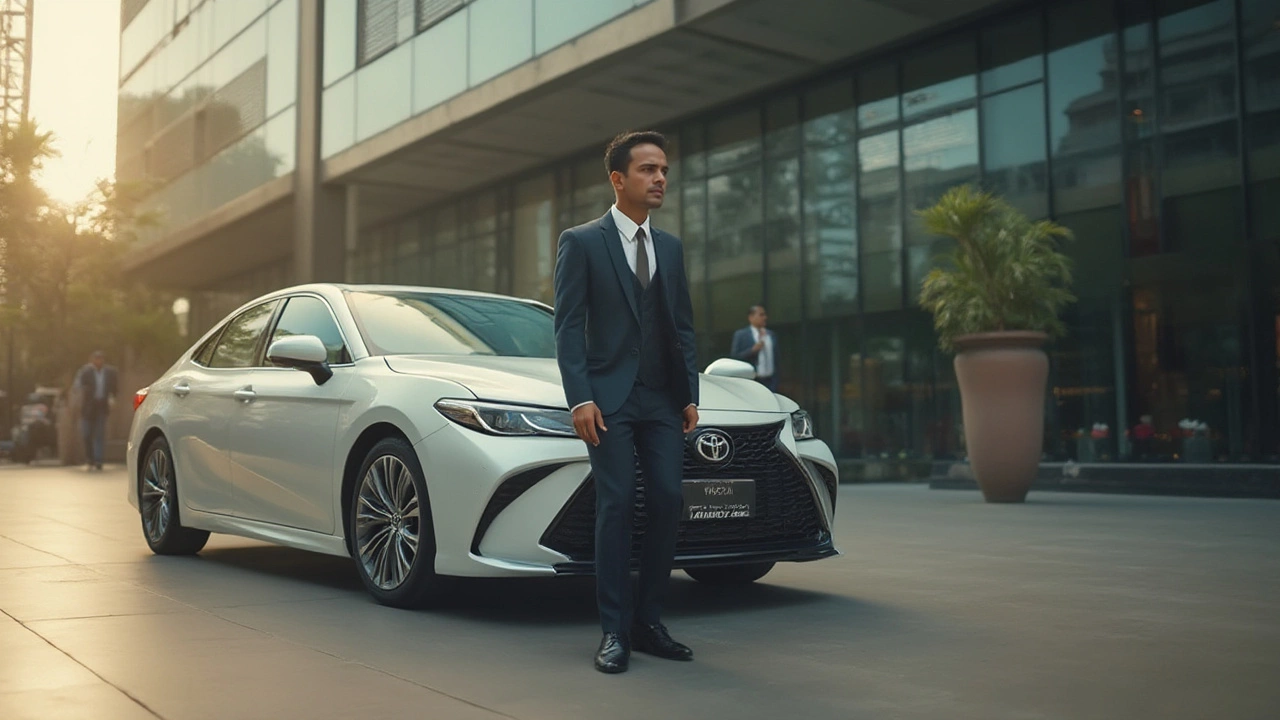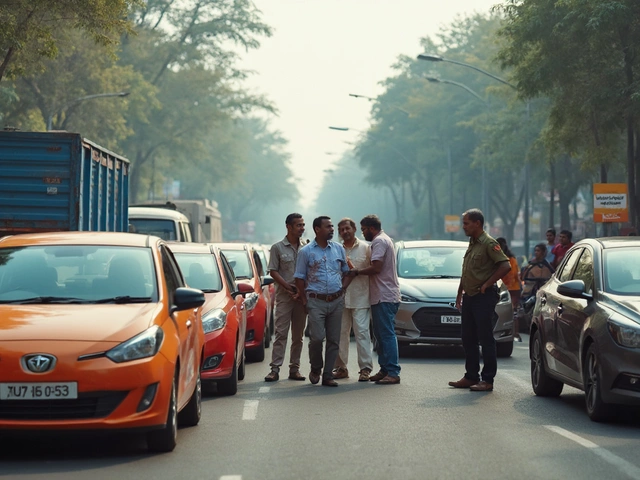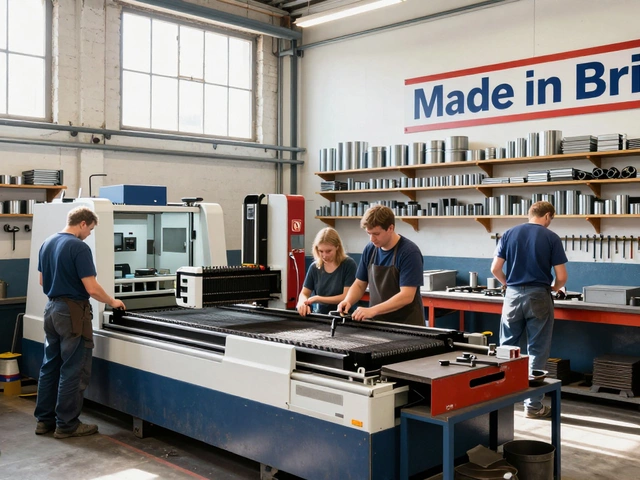Imagine two parking spots at a busy Indian tech park. One holds a shiny Toyota Camry, the other a German luxury sedan costing double. Passersby don’t look twice at the German badge, but heads actually turn toward the Camry. Sound odd? Not to folks familiar with Indian car culture. The Toyota Camry isn’t just a sedan in India—it’s a quiet status symbol, an emblem of reliability, and a surprising favorite in a country crazy about SUVs and compact hatches. But what’s behind this passion for a large, subtle, hybrid luxury sedan that rarely makes automotive headlines? The Camry’s story in India says plenty about changing aspirations, practical thinking, and seeing value in surprising places.
The Quiet Allure of the Camry: Comfort, Tech, and Resale
Step into a Camry in India, and you don’t feel like you’re in just any sedan. Plush leather, roomy back seats perfect for being chauffeured around, climate control vents even for rear passengers, and that gentle hum of a hybrid engine—each detail signals both luxury and practicality. Indians often like to merge comfort with value, and the Camry delivers by offering an executive car experience without the sky-high maintenance headaches of some luxury German brands. It’s not about flashy badge value; it’s about silent confidence.
Let’s get specific: since 2019, Toyota has only sold the Camry in India as a hybrid, and that’s a real win for the environmentally aware and fuel-conscious driver. On paper, the Camry hybrid delivers 23.27 km/l in certified conditions, according to the Automotive Research Association of India. In real-world city traffic, owners report 16–19 km/l, which is far ahead of many other petrol-only sedans in the same price range. Thanks to Toyota’s solid reputation for long-term reliability, the cost of running a Camry after the first few years is surprisingly manageable. It’s common to see Camrys on Indian roads boasting odometer readings above 150,000 km, still running quietly with minimal hiccups.
Resale value might not sound glamorous, but it’s a huge deal in India’s car market. Few sedans hold their value like a Camry. Buying a used Camry—say, a 2016 model—costs just a notch below its original sticker price, while most non-Toyota rivals drop in value like a rock after a few years. This means buyers see the Camry not just as a car but almost like a solid investment that won’t tank their finances a few years down the road.
Here's a quick look at recent cost and performance comparisons:
| Model Year | Fuel Economy (km/l, real-world) | Standard Warranty (years/km) | Average Resale Value (5 years) |
|---|---|---|---|
| 2021 Camry Hybrid | 17 | 3/100,000 | 60-65% |
| 2021 Skoda Superb | 11 | 4/100,000 | 45-50% |
| 2021 Honda Accord (discontinued) | 13 | 3/100,000 | 38-42% |
For professionals and business owners, status is often communicated in code: ‘smart choice, minimal fuss’. The Camry fits this thinking perfectly. Unlike a German luxury car, you’re not seen as trying too hard—yet everyone knows you’ve made a wise choice.
Practicality, Safety, and Toyota’s Famous Reliability
Let’s talk about Indian roads. One pothole and your alloy wheel is history—unless your car is built to absorb punishment. The Camry, with its soft suspension and forgiving ride, makes gnarly city roads and highway expansion joints feel like minor inconveniences. And then there’s ground clearance: Camry is engineered with enough height to glide over speedbreakers, which are sprinkled across Indian cities like confetti. Compare it to some low-slung European sedans, and you’ll see why Indian families prefer the Japanese design philosophy.
Now, there’s a simple trust people have in Toyota. This has almost mythic proportions in India. Stories of Qualis and Innovas running trouble-free for 300,000 km are shared over cups of chai in every Indian city. The Camry benefits hugely from this glow of confidence. People aren’t just buying a car—they’re buying peace of mind about spares, maintenance, and running costs. And Toyota’s network of dealerships covers even remote towns, so whether you need a new hybrid battery or a quick check-up, it’s easy and affordable by D-segment sedan standards.
Safety? Here the Camry punches above its weight. Ten airbags, active stability control, ABS with EBD, and ISOFIX child-seat anchors come standard. While crash-test data isn’t available for the latest India-spec Camry, the Australia and Euro versions rate five stars with ANCAP and Euro NCAP. This kind of reputation isn’t lost on Indian buyers who ferry family, or on professionals whose children occupy the rear seat more often than not.
Here’s where things get more interesting: hybrids have historically worried people with their ‘what if the battery dies?’ questions. But Toyota’s hybrid tech has proven itself globally, with many Priuses used as taxis running with original batteries even after 10 years in the wild. In India, the Camry gets an 8-year/160,000 km hybrid battery warranty, which is probably enough to calm the nerves of even the most skeptical uncles.

Cultural Signals: Status, Taste, and Cross-Generation Appeal
Car buying in India isn’t just a personal act. It’s a family decision, sometimes debated over a dozen WhatsApp groups and family dinners. Picking a Camry is more than just liking the way it drives—you often need to convince parents, uncles, and elders who see cars differently. To them, the Camry means ‘prosperous, modern but grounded, not wasteful.’ It has quietly entered Bollywood movies as the car of choice for the wise, understated boss. You’ll spot them outside top hospitals, academic campuses, and high-end office towers from Mumbai to Bengaluru.
This is also a car that fits the self-image of NRIs (Non Resident Indians) visiting home. Many of them grew up seeing the Camry as an aspiration during their trips to the US or Gulf. When they return, they bring that taste with them—and many go straight for the Camry instead of the more flamboyant BMW or Mercedes, which might smell a bit too much of show-off. No wonder you frequently spot Camrys with Embassy or Government number plates, driven by diplomats, or senior officials. It’s the objectivity, reliability, and status that speak volumes without making noise.
Don’t miss the generational factor, either. Tech-savvy young professionals in cities love the gadgetry and smooth hybrid power. Retired parents enjoy the soft ride and low cabin noise. It doesn’t polarize opinions—Camry fits neatly into middle-class ideals of ‘smart, safe, and good for family.’
Tips for Indian Car Buyers: Getting the Most from Your Camry Purchase
If you’re going Camry shopping in 2025 India, here’s some real-world advice:
- Test the Hybrid Experience: The silent start and low-speed EV mode are surprising if you’ve only driven older petrols or diesels. Try driving with the sound system off—you might find yourself enjoying the near-silence on city roads.
- Negotiate Add-ons: Dealers in major cities often package in accessories—floor mats, ceramic coating, extended warranties. Don’t settle for the sticker price; push for benefits, especially at the end of a financial quarter.
- Spare Parts and Servicing: Stick to authorized Toyota service centers, especially for hybrid components. Service costs are predictable, usually falling between Rs. 8,000 and 15,000 for routine maintenance every 10,000 km.
- Insurance Savvy: Camry’s higher valuation and hybrid tech push up premium costs. Compare comprehensive insurance plans from private players, who often give better NCB (no-claim bonus) rates and hybrid-specific discounts.
- Resale Gameplan: Maintain a full service record and prefer basic color choices (white, silver, grey)—these fetch better resale. Camrys rarely linger long in India’s used-car market, but showroom condition and clarity on battery warranty matter most.
- Family Approval: If you’re buying for more than just yourself, bring relatives to the test drive. The back seat is a selling point, especially for elders. Their thumbs-up can seal the deal—and save a lot of debate later.
Striking fact: in 2023, Toyota sold 1,341 Camrys in India—tiny compared to mass-market hatchbacks, but outselling rivals like the Skoda Superb and easily topping the premium sedan list. In a market obsessed with SUVs, the Camry carves out a loyal niche. Its staying power isn’t luck. It’s built on Toyota’s reputation, smart hybrid tech, and on a special kind of status—never too loud, never risky, always just right for the practical Indian heart.






